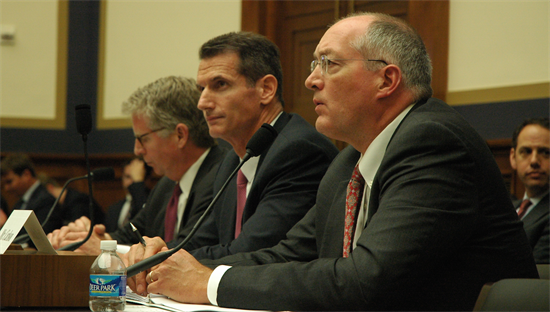Terrorism Financing Task Force Evaluates Security of U.S. Financial Sector
Washington,
June 24, 2015
The Financial Services Task Force to Investigate Terrorism Financing held a hearing on Wednesday to examine how terrorist groups exploit the U.S. banking system to raise and launder their revenue. “The U.S. financial sector is too important for this task force to overlook when seeking to address the nexus of terrorism and finance. The continued innovation and evolution by our enemies highlights the importance of this body’s role in the fight against terror. The United States must do better when defending our financial system and addressing the threats operating within it. The risk is too great to ignore,” said Task Force Chairman Michael Fitzpatrick (R-PA).Key Takeaways from the Hearing:
“Indeed, shell companies doing business in New York can be used to disguise the activities of entire foreign governments. In 2006, my office was investigating the Alavi Foundation, a non-profit organization which owned a 60 percent stake in a 36-story office building in midtown Manhattan. The remaining 40 percent was owned by the Assa Corporation, a New York-incorporated entity, and by Assa Company Limited, which was incorporated in the Channel Islands. We ultimately determined that the Assa entities were merely shells being used to disguise the building’s actual owner, a bank called ‘Melli.’ Bank Melli, as you may be aware, is wholly owned by the government of Iran.” - The Honorable Cyrus Vance, Jr., New York County District Attorney "The current cyber threat environment continues to evolve and intensify. Each day, cyber risk grows as attacks increase in number, pace, and complexity. Our members constantly adapt to this changing threat environment. We are no longer in the days wherein the threat was confined to individual hacktivists and fraudsters. We are now in an era of attacks by not only organized crime syndicates, but also nation-states and entities affiliated with terrorist operations." - John Carlson, Chief of Staff, Financial Services Information Sharing and Analysis Center "Illicit financing networks, like the business of most enterprises, almost always implicate more than one financial institution. Whether in the process of raising, moving, using or laundering funds associated with illicit activity, such networks almost invariably transact across multiple financial institutions. For the illicit financing networks of most pressing concern, transactions also often cross multiple jurisdictions. Identifying, tracking and tracing these networks therefore depends critically upon information-sharing across financial institutions and across borders." - Chip Poncy, Senior Counselor, Center on Sanctions and Illicit Finance at the Foundation for Defense of Democracies |


